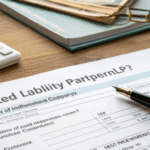When it comes to taxes and business structures, many people find themselves confused by the specific requirements for various forms. One question that often arises is whether a Limited Liability Partnership, commonly known as an LLP, should receive a 1099 form.
This article will dive deep into this topic, explaining what a 1099 form is, how LLPs are treated for tax purposes, and under what circumstances an LLP receives a 1099. We will also discuss common misconceptions, best practices, and the consequences of not properly handling these tax forms. By the end of this article, you will have a clear understanding of the connection between LLPs and 1099 forms.
What Is a 1099 Form?
A 1099 form is an informational tax document used by the Internal Revenue Service (IRS) to track various types of income paid to non-employees. Unlike the W-2 form, which is issued to employees, a 1099 is typically sent to independent contractors, freelancers, and other entities that provide services but are not formally employed by the payer. The purpose of the 1099 form is to ensure that all taxable income is reported, and the IRS receives accurate data on payments made during the tax year.
There are multiple types of 1099 forms, but the most relevant to business payments are 1099-NEC and 1099-MISC. The 1099-NEC is used primarily for reporting payments made for services, such as contractor fees, while 1099-MISC may cover rents, prizes, or other miscellaneous income. Businesses are required to issue these forms if they have paid $600 or more to a non-employee for services within the tax year. This form helps the IRS confirm that the receiving party reports this income on their tax return.
How Does an LLP Work?
A Limited Liability Partnership is a unique business structure that combines elements of partnerships and corporations. It provides the benefit of limited liability to its partners, meaning that individual partners are generally not personally liable for the debts or legal obligations of the business. LLPs are often favored by professional groups like lawyers, accountants, and architects due to this protection.
For tax purposes, LLPs are typically treated as partnerships unless they elect to be taxed as a corporation. This means that the LLP itself does not pay income taxes directly. Instead, the income and expenses “pass through” to the individual partners, who report their share on personal tax returns. This pass-through taxation avoids the double taxation issue faced by some corporations.
Understanding the tax treatment of LLPs is critical when discussing the issuance of 1099 forms. Since LLPs are partnerships by default, payments to an LLP are generally handled similarly to payments to any other partnership, but there are nuances that affect whether a 1099 must be issued.
When Is a 1099 Required for an LLP?
The IRS requires businesses to issue 1099 forms to entities or individuals when certain payments are made. However, there are exceptions based on the entity type receiving the payment. Typically, payments made to corporations do not require a 1099 form. This exception extends to many LLPs that have elected corporate tax treatment or are treated as corporations by default in some states.
For LLPs treated as partnerships, a 1099-NEC or 1099-MISC may need to be issued if payments meet the IRS threshold, which is $600 or more during the tax year. However, if the LLP has provided a W-9 form indicating that it is taxed as a corporation, the payer generally does not have to issue a 1099.
This is why obtaining a properly completed W-9 form from the LLP is important before issuing payments. The W-9 form will specify the taxpayer identification number (TIN) and the entity’s classification, which informs the payer whether a 1099 is necessary.
Types of 1099 Forms Relevant to LLPs
The two primary types of 1099 forms relevant to LLPs are 1099-NEC and 1099-MISC. The 1099-NEC is the most common form used to report non-employee compensation such as fees paid to contractors, consultants, and service providers. If an LLP provides services and is not taxed as a corporation, payments made to it for these services are reported on the 1099-NEC.
On the other hand, the 1099-MISC form can cover other types of payments such as rents, royalties, prizes, awards, and other miscellaneous income. For instance, if an LLP leases office space and receives rental payments, the payer might issue a 1099-MISC to report those payments.
Understanding which form to use is essential for compliance. Incorrect form usage can lead to IRS penalties and complicate tax reporting for both parties. Therefore, businesses making payments to LLPs should ensure they know the nature of the payments to select the proper 1099 form.
How to Properly Issue a 1099 to an LLP
Issuing a 1099 to an LLP involves several key steps. First, the payer should collect a W-9 form from the LLP before making any payments. This form provides the legal name, business classification, and taxpayer identification number, which is critical for accurate reporting.
Once payments are made, the payer must track the total amounts paid to the LLP during the year. If the total payments exceed $600, the payer is responsible for issuing the 1099-NEC or 1099-MISC by the IRS deadline, which is usually January 31 of the following year. The payer should send a copy to the IRS and the LLP.
Recordkeeping is also important. The payer should retain copies of the W-9 form, the payments made, and the issued 1099 forms for at least three years in case of IRS audits or inquiries. This documentation protects both parties and ensures transparency.
Common Confusions About LLPs and 1099s
There are several common misunderstandings about the relationship between LLPs and 1099 forms. One frequent confusion is treating LLPs like corporations and assuming that no 1099 is required. However, the requirement depends on the LLP’s tax classification, which varies.
Another misconception is that all partnerships must receive 1099s for payments. While most service payments to partnerships require 1099 reporting, payments to corporations or LLPs taxed as corporations are exempt. This nuance often causes errors when businesses do not verify the tax status of the LLP.
Also, some people believe that LLPs never receive 1099s because they have “limited liability.” Limited liability refers to legal protection against business debts and lawsuits and does not affect tax reporting requirements. Therefore, LLPs can and do receive 1099 forms when the IRS rules apply.
What Happens If a 1099 Is Not Issued?
Failing to issue a required 1099 form can lead to consequences for both the payer and the payee. The IRS imposes penalties on payers who do not file correct information returns or fail to provide payees with the required forms on time. These penalties can increase depending on how late the forms are filed and whether the failure is intentional.
For the LLP receiving income, not receiving a 1099 does not relieve the responsibility of reporting the income on its tax return. The IRS may question discrepancies if the LLP reports income that does not match information reported by payers.
Therefore, it is in the best interest of both parties to ensure timely and accurate 1099 filing. The payer avoids penalties, and the LLP maintains clean financial records that align with IRS requirements.
How LLPs Report Income from 1099s
LLPs typically report income and expenses on IRS Form 1065, the U.S. Return of Partnership Income. Each partner receives a Schedule K-1, which details their share of the partnership’s income, deductions, and credits. Partners then report this information on their individual tax returns.
When an LLP receives a 1099 form, it uses the reported income as part of its total revenue on Form 1065. The 1099 forms help the LLP reconcile its records and ensure all income is accounted for. Partners must also be aware that the income flows through to them and will be taxed on their personal returns.
Proper recordkeeping and reconciliation of 1099 income are vital to avoid IRS audits or notices. LLPs should maintain detailed documentation of all payments received, including 1099 forms, invoices, and contracts.
Special Cases and Industry Examples
Certain industries that frequently operate as LLPs have specific considerations for 1099 reporting. For example, law firms commonly structured as LLPs often receive 1099-NEC forms for payments made by clients or other businesses. Because law firms may provide both legal and consulting services, careful attention must be paid to the nature of payments and tax classification.
Consulting firms operating as LLPs also face 1099 reporting obligations. If a business hires an LLP consultant, it must issue a 1099-NEC unless the LLP is taxed as a corporation. Other professional services such as accounting and architecture, often structured as LLPs, follow similar rules.
These industry examples illustrate the importance of understanding the LLP’s tax status and the specific services provided to apply the correct 1099 requirements.
Final Thoughts and Best Practices for LLPs
The question of whether an LLP gets a 1099 is nuanced and depends heavily on the LLP’s tax classification and the nature of payments made. While many LLPs do receive 1099 forms, those classified as corporations typically do not. It is crucial for businesses paying LLPs to collect and verify a W-9 form before issuing payments.
Both payers and LLPs should maintain organized records and communicate clearly to avoid confusion. Issuing or receiving 1099s correctly ensures compliance with IRS regulations and prevents costly penalties. LLPs should also consult tax professionals to navigate the complexities of their unique tax situations.
Understanding these tax requirements helps businesses stay compliant and financially healthy. If you are considering forming a different type of business entity or want to learn more about setting up a Limited Liability Company, you may find our detailed guide on starting an LLC in California very helpful for navigating formation steps and tax considerations.











